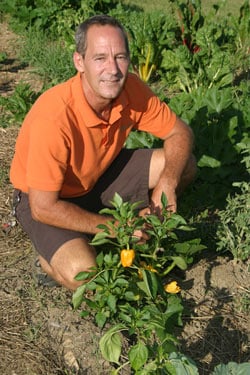Garden Crusader: Bill Dawson
2005 Garden Crusader Award
 Garden Crusader Bill Dawson
Garden Crusader Bill DawsonGardening has always been part of Bill Dawson's life. Growing up in Ohio, he would often help his German grandfather in their large vegetable garden. As an adult, his work on golf courses and landscaping projects fueled a growing passion for plants. However, it wasn't until he began working for Ameriflora (an International Flower Exposition) in 1992, that he got a taste for the people-side of gardening. "I ran a youth program with disadvantaged kids from the Columbus, Ohio, area. We worked together landscaping homes around the city's Franklin Park in preparation for an Ameriflora horticultural exposition," says Bill. "We landscaped 70 houses, and along the way I really got hooked on working with these kids. They grew personally and socially in the process of creating beautiful landscapes they could be proud of," he says.
Franklin Park Conservatory & Botanical Gardens
After Ameriflora was over, instead of going back to landscaping, Bill stayed on at the Franklin Park Conservatory & Botanical Gardens and worked on the gardens. "We had to start from scratch," he says. "When the exposition was over and Ameriflora left the area, they took most of the plants and equipment with them." Bill was now doing most of the work in the gardens by himself, but he thought about the kids he had worked with at Ameriflora and began gathering volunteers to help out.
Growing to Green
In 2002 Bill took over the Growing to Green Community Garden Program, which was developed to build and assist community gardens, school gardens and beautification projects in Columbus. At the time, there were very few community gardens in the city and all were struggling to survive.
Three years later, there are more than 50 community gardens and 35 other school gardens and beautification projects in Columbus. Although Bill didn't start them all, he's been a vital resource for many of them. He helps secure starter funding for the gardens and has implemented the Scotts Urban Garden Academy. Once a civic group or neighborhood association receives a grant to start a garden, they enroll in Bill's eight-week community gardening course. It's more than just learning about plants. Bill teaches about fundraising, motivating volunteers, community organizing, and garden program maintenance. "What good is starting a new garden, if you can't keep it going with the resources you have?" says Bill.
One project he's particularly proud of involves juvenile offenders from the Franklin County Juvenile Court system. The court officers wanted to have first-time offenders create a garden as a way of fulfilling their community service. Bill worked with the youth offenders and city and county officials to help clean out a city lot in the roughest section of town. He helped design the gardens, install the plants, and train the youth and supervisors on how to keep the project running. "After only one year of growing this garden, they won the city-wide award for Best Community Garden," says Bill. The youth really took pride in their work and appreciated the beautiful, productive garden they created. "Much of the food grown went to the local food pantry so they felt like they were giving back to the same community they had offended," says Bill.
Bill's Demonstration & Teaching Garden
In addition to helping gardeners around the city, Bill still makes time to plant, maintain and teach classes at the Franklin Park Conservatory & Botanical Gardens. "There's a 19-plot model community garden on site that I oversee. We're very involved in Plant a Row for the Hungry, so I ask each community gardener to donate a certain percentage of their produce to the local food bank," says Bill.
The apple of Bill's eye is the quarter-acre demonstration garden at Franklin Park Conservatory. Bill uses it to teach youth and adult groups. There is an organic vegetable garden, a fruit garden, a sensory garden, a cut-flower garden, two shade gardens, an herb garden, a perennial garden and a newly installed accessible garden. "I worked with local high school kids to design and plant in the accessible garden," says Bill. "We also developed curriculum for schools and the therapeutic recreation program to use in the garden." The accessible garden includes three raised table beds so kids in wheelchairs can roll right up to their gardens.
Greater Columbus Foodshed Project
Even though Bill's plate is full with the demonstration gardens and consulting with the community and school garden groups, he is still working collaboratively on other citywide projects. The Greater Columbus Foodshed Project approached Bill a few years ago to start gardens at 24 Head Start sites around the city over a three-year period. Bill worked with the staff at the Head Start sites?many of them teenagers?and taught them how to teach the children about gardening. "We not only had kids learning about gardening, but they also learn about nutrition and good eating habits at a very young age," he says. "This is when you really can make a difference."
Bill's one-man-band approach to making Columbus a more gardening-friendly city is being noticed elsewhere. He's been talking with the American Community Gardening Association (ACGA), a national organization dedicated to promoting community gardening, and they've decided to move their headquarters to Franklin Park Conservatory and Botanical Gardens in the near future. It looks like Bill won't be running out of ideas for bigger and better gardening projects any time soon!
Print this Article:
Get the Dirt
Stay up to date on new articles and advice. Please fill out the information below.
